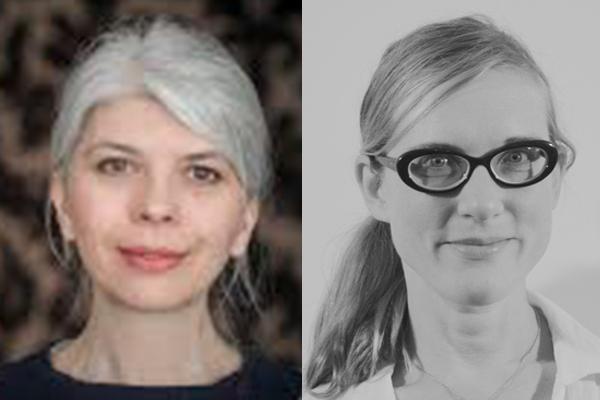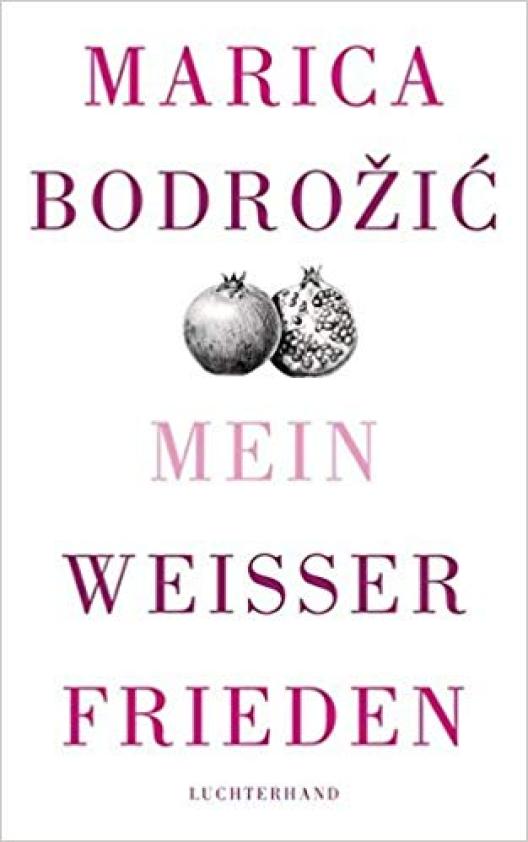Interview with Novelist and Poet Marica Bodrožić

The following post is a description of a video interview recorded on August 30, 2019 in May Mergenthaler's German 3102 course. The post is written by May Mergenthaler, assistant professor in the Department of Germanic Languages and Literatures.

In my advanced German culture and language class, German 3102 — News and Views: Conversations about Current Issues in the German-Speaking World, students learn about current events in German-speaking countries, focusing on a variety of topics. One topic we covered was migration. In preparation for the discussion of how migration is presented in the media — which is the focus of this course — we read crucial selections from renowned, Berlin-based author Marica Bodrožić’s book Mein weißer Frieden (literally translated as “My White Peace”). The book is a combination of a memoir and a travel account in which Bodrožić describes her move from Dalmatia (in former Yugoslavia) to the state of Hessen (in former West-Germany in 1983) as a 9-year old girl, and her travels back to her home region, which is now a part of Croatia. The account focuses on the impact that the wars in former Yugoslavia had on the people who remained and those who left before and during the wars, with a particular emphasis on the Croatian War of Independence (1991-1995) and the massacres committed by the warring factions (although Croats committed fewer crimes than their opponents). Students read two selections from this memoir/travel account that tell about Bodrožić’s move to Germany, the losses she felt and then her return to Croatia, where she faces her aunt mourning the suicide of her child, as well as posters that celebrate convicted war criminals as war heroes.
During our conversation with Marica Bodrožić, the author first read those selections, of about two pages each, in two installments, and after each reading, she answered students’ questions and elaborated on what she had read. The reading and the conversation were conducted entirely in German. Students had prepared questions in advance, which touched both on style and content. Students asked about the metaphor the author used to describe her feelings after her move to Germany (stars and cherries). Bodrožić told us about the importance of fruit and fruit trees in her childhood and about her view of loneliness, depicted a cherry pit, as a prerequisite for creativity, and even for a fulfilled life. Students also learned about how the death of Bodrožić’s young male cousin was her motivation to write the book as a means to come to terms with his death and with the war that most likely led to the trauma triggering the suicide, and to commemorate the young man. Students also asked about Bodrožić’s thoughts about her relatives who stayed in Croatia and who often welcomed the war and still today believe that it was necessary. She described how she condemns many of her relatives’ thoughts and actions related to the war but still loves them as relatives and people. Bodrožić concluded our conversation with reflections on her friendship with war refugees from Syria in Berlin today who share some of her experiences and on the need for literary and poetic representations of migration that focus on the individual and that can complement, or even correct, news reports that emphasize numbers and that usually present fates of anonymous migrants. Literature, Bodrožić suggested, can remind us that all refugees and migrants are people who deserve our empathy.
After our farewell, students expressed how happy they were to have spoken with Marica Bodrožić in person. They commented on her poetic voice during her reading and how different it was from her conversational voice. They gained a new perspective on the text by hearing it read by her. Students also commented on how they enjoyed her comments on loneliness, war and migration. Yesterday, we discussed news articles about migration and compared their style and content with Bodrožić’s account, focusing on voice, perspective, style and content. The approach to combine literature and news media on migration seems to have been successful, and I thank the project organizers of Migration, Mobility and Immobility for their support of this memorable experience, which I hope will last a lifetime for the students.
